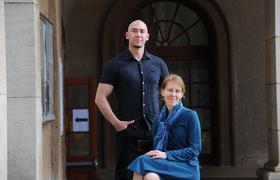Online programme fosters growth mindset among students during exams
01 November 2023 | Story Niémah Davids. Photo Michael Hammond. Read time 4 min.
With finals looming, two University of Cape Town (UCT) academics have developed a uniquely tailored online programme to equip students with the skills they need to navigate this nerve-wracking, stressful exam period with ease.
Designed specifically with UCT students in mind, the Growth Mindset Support Programme aims to continuously reinforce growth mindset principles and support students as they prepare for their final exams – the last stretch of the academic year. The programme forms part of the positive psychology co-curricular activities, developed to build resilience and grit among students, while focusing on various aspects such as character, strength, goal setting, gratitude and academic performance.
“The Growth Mindset Support Programme uses tried and tested principles to equip students with a mindset that fosters resilience, adaptability and a positive approach to their academic challenges.”
The masterminds behind the programme are Dr Anita Campbell, a senior lecturer in mathematics who’s also part of the Academic Support Programme for Engineering in UCT’s Faculty of Engineering & the Built Environment (EBE); and her colleague Sean Abrahams, a PhD candidate in the School of Education and a member of the university’s Residence Life Division.
Developing students’ capabilities
“The Growth Mindset Support Programme uses tried and tested principles to equip students with a mindset that fosters resilience, adaptability and a positive approach to their academic challenges,” Dr Campbell said.
The programme enforces three fundamental principles:
- Embrace challenges and view them as opportunities.
- Effort matters – always highlight the role that effort plays in academic success and emphasise that hard work contributes to learning improvement.
- Learn from setbacks – stress the importance of learning from failures and turning setbacks into opportunities to attain personal and academic development.
Campbell explained that these growth mindset principles are based on American psychologist Carol Dweck’s concepts, which underscore that it’s possible to develop students’ abilities through hard work and dedication to their studies.
“Students [who are] used to high academic achievement at high school may believe that they are naturally gifted academically. Yet, when faced with new [studying] demands and limited time at university, baseline abilities are not enough. Growth mindset principles empower students to overcome challenges, view failures positively and cultivate a love for learning,” she said.
Unique aspects
The programme provides students with the tools and strategies they need to manage their stress levels, maintain a positive, can-do mindset, and to approach their upcoming exams with a growth-orientated outlook. This approach, Campbell added, will enhance overall performance and well-being during this critical period.
And to assist with enforcing this mindset, the programme offers students daily motivational messages, and reflection prompts without demanding students’ input and feedback. Once the exam period concludes, students who have signed up for the programme will have an opportunity to engage with similar content through videos, websites and books, and to share their feedback via online and in-person question-and-answer sessions, and anonymously.
“By adopting a growth mindset, you begin to understand your current abilities and highlight areas for further development.”
“Exams are often seen as a form of judgement, as if they’re passing a verdict on your worth as a person, and this perspective aligns closely with a fixed mindset. But what we want to promote is that by adopting a growth mindset, you begin to understand your current abilities and highlight areas for further development. It doesn’t imply personal worthlessness,” Campbell said.
“Instead, a lower grade signals that you haven’t reached a certain level yet and that there’s still work to be done. Students should consider this lower grade as a constructive guide for improvement rather than a statement about their overall worth.”
 This work is licensed under a Creative Commons Attribution-NoDerivatives 4.0 International License.
This work is licensed under a Creative Commons Attribution-NoDerivatives 4.0 International License.
Please view the republishing articles page for more information.










